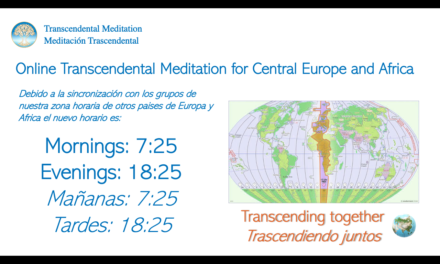
References: Scientific Research on Transcendental Meditation—Business

References : Scientific Research on Transcendental Meditation—Business
B1. Improved Job Performance
Employees who learned Maharishi’s Transcendental Meditation Programme showed improved job performance in comparison to control subjects. Reference: Academy of Management Journal 17: 362–368, 1974.
B2. Increased Employee Effectiveness
A study of executives and workers in the automotive industry found that after three months of regular practice of the Transcendental Meditation Programme, employees showed increased effectiveness, in comparison to controls from the same work sites. Reference: Anxiety, Stress and Coping: An International Journal 6: 245–262, 1993.
B3. Increased Occupational Coherence
A study of executives and workers in the automotive industry found that after three months of regular practice of the Transcendental Meditation Programme, employees showed increased occupational coherence, as assessed by seven job-related measures, in comparison to controls from the same work sites. Reference: Anxiety, Stress and Coping: An International Journal 6: 245–262, 1993.
B4. Increased Job Satisfaction
Employees who learned Maharishi’s Transcendental Meditation Programme showed increased job satisfaction in comparison to control subjects. Reference: Academy of Management Journal 17: 362-368, 1974.
B5. Increased Job Satisfaction in Executives and Workers
A study of executives and workers in the automotive industry found that after three months of regular practice of the Transcendental Meditation Programme, employees showed increased job satisfaction, in comparison to controls from the same work sites. Reference: Anxiety, Stress and Coping: An International Journal 6: 245–262, 1993.
B6. Increased Satisfaction with Professional and Personal Life
A study of executives and workers in the automotive industry found that after three months of regular practice of the Transcendental Meditation Programme, employees showed increased professional and personal satisfaction, in comparison to controls from the same work sites. Reference: Anxiety, Stress and Coping: An International Journal 6: 245–262, 1993.
B7. Decreased Desire to Change Jobs
Employees who learned Maharishi’s Transcendental Meditation Programme showed decreased desire to change their job in comparison to control subjects. Reference: Academy of Management Journal 17: 362-368, 1974.
B8. Improved Work and Personal Relationships
A study of executives and workers in the automotive industry found that after three months of regular practice of the Transcendental Meditation Programme, employees showed improved work and personal relationships, in comparison to controls from the same work sites. Reference: Anxiety, Stress and Coping: An International Journal 6: 245–262, 1993.
B9. Improved Relationships with Supervisors
Employees who learned Maharishi’s Transcendental Meditation Programme showed improved relationships with their supervisors in comparison to control subjects. Reference: Academy of Management Journal 17: 362-368, 1974.
B10. Improved Relationships with Co-Workers
Employees who learned Maharishi’s Transcendental Meditation Programme showed improved relationships with their co-workers in comparison to control subjects. Reference: Academy of Management Journal 17: 362-368, 1974.
B11. Decreased Tension on the Job
A study of executives and workers in the automotive industry found that after three months of regular practice of the Transcendental Meditation Programme, employees showed decreased job tension, in comparison to controls from the same work sites. Reference: Anxiety, Stress and Coping: An International Journal 6: 245–262, 1993.
B12. Decreased Trait Anxiety in Executives and Workers
A study of executives and workers in the automotive industry found that after three months of regular practice of the Transcendental Meditation Programme, employees showed decreased trait anxiety, in comparison to controls from the same work sites. Reference: Anxiety, Stress and Coping: An International Journal 6: 245–262, 1993.
B13. Decreased Anxiety in Industrial Workers
A study conducted at Sumitomo Heavy Industries by the Japanese National Institute of Industrial Health found decreased anxiety in workers who learned the Transcendental Meditation Programme, in comparison to control workers. Reference: Japanese Journal of Industrial Health 32: 656, 1990.
B14. Increased Physiological Calmness in Executives and Workers
A study of executives and workers in the automotive industry found that after three months of regular practice of the Transcendental Meditation Programme, employees showed increased physiological calmness, as assessed both during rest and during task performance, in comparison to controls from the same work sites. Reference: Anxiety, Stress and Coping: An International Journal 6: 245–262, 1993.
B15. Decreased Stress During Task Performance
A study of executives and workers in the automotive industry found that after three months of regular practice of the Transcendental Meditation Programme, employees showed decreased physiological stress (reduced skin conductance) during performance of a task, in comparison to controls from the same work sites. Reference: Anxiety, Stress and Coping: An International Journal 6: 245–262, 1993.
B16. Improved Sleep Quality in Executives and Workers
A study of executives and workers in the automotive industry found that after three months of regular practice of the Transcendental Meditation Programme, employees showed improved sleep quality, in comparison to controls from the same work sites. Reference: Anxiety, Stress and Coping: An International Journal 6: 245–262, 1993.
B17. Improved Night Sleep in Industrial Workers
A study conducted at Sumitomo Heavy Industries by the Japanese National Institute of Industrial Health found that workers who learned the Transcendental Meditation Programme fell asleep more easily at night, in comparison to control workers. Reference: Japanese Journal of Public Health 37(10 Suppl.): 729, 1990.
B18. Decreased Tendency of Neurosis in Industrial Workers
A study conducted at Sumitomo Heavy Industries by the Japanese National Institute of Industrial Health found decreased tendency of neurosis in workers who learned the Transcendental Meditation Programme, in comparison to control workers. Reference: Japanese Journal of Industrial Health 32: 656, 1990.
B19. Decreased Emotional Instability in Industrial Workers
A study conducted at Sumitomo Heavy Industries by the Japanese National Institute of Industrial Health found decreased emotional instability in workers who learned the Transcendental Meditation Programme, in comparison to control workers. Reference: Japanese Journal of Industrial Health 32: 656, 1990.
B20. Decreased Impulsiveness in Industrial Workers
A study conducted at Sumitomo Heavy Industries by the Japanese National Institute of Industrial Health found decreased impulsiveness in workers who learned the Transcendental Meditation Programme, in comparison to control workers. Reference: Japanese Journal of Industrial Health 32: 656, 1990.
B21. Decreased Cigarette and Liquor Consumption in Executives and Workers
A study of executives and workers in the automotive industry found that after three months of regular practice of the Transcendental Meditation Programme, employees showed decreased cigarette consumption and decreased liquor consumption, in comparison to controls from the same work sites. Reference: Anxiety, Stress and Coping: An International Journal 6: 245–262, 1993.
B22. Increased Freedom from Smoking in Industrial Workers
A study conducted at Sumitomo Heavy Industries by the Japanese National Institute of Industrial Health found an increase in the number of workers free from smoking among those who learned the Transcendental Meditation Programme, in comparison to control workers. Reference: Japanese Journal of Public Health 37(10 Suppl.): 729, 1990.
B23. Increased Contribution of Managers to the Organization
A three-month prospective study of managers at a medical equipment company found that those who learned Transcendental Meditation, compared to matched controls, showed increased ‘organizational contribution’, which was a combined index of observer ratings of higher productivity, better leadership practices, better work relationships, greater vitality, greater mental health, higher job satisfaction, and less anger. Reference: Dissertation Abstracts International 57(6): 4068B, 1996.
B24. Increased Health-Promoting Behaviour of Managers
Managers at a medical equipment company who learned the Transcendental Meditation Programme, in contrast to matched controls, showed more healthy behaviour after three months, as measured by reduced alcohol consumption and more healthy and regular habits of exercise, diet, and sleep. Reference: Dissertation Abstracts International 57(6): 4068B, 1996.
B25. Decreased Stress among Managers
A three-month prospective study of managers at a medical equipment company found that those who learned Transcendental Meditation, compared with matched controls, showed a significant reduction on a standardized measure of perceived stress measuring the degree to which situations in one’s life are perceived as overloading, uncontrollable or unpredictable. Reference: Dissertation Abstracts International 57(6): 4068B, 1996.
B26. Decreased Symptoms of Ill Health among Managers
Managers who learned the Transcendental Meditation Programme, in comparison to matched controls, showed a significant decrease on a standardized measure of stress-related somatic symptoms, such as chest pain and headaches, during a three-month study. Reference: Dissertation Abstracts International 57(6): 4068B, 1996.
B27. Improved Mental Health of Managers
Managers who learned the Transcendental Meditation Programme, in contrast to matched controls, increased significantly on a standardized self-report measure of mental health during a three-month study. Reference: Dissertation Abstracts International 57(6): 4068B, 1996.
B28. Increased Vitality of Managers
Managers of a medical equipment company who learned the Transcendental Meditation Programme, in contrast to matched controls, showed a significant increase on a standardized scale of physical vitality, measuring greater energy level and less fatigue. Reference: Dissertation Abstracts International 57(6): 4068B, 1996.
B29. Decreased Anxiety in Government Personnel
Employees at a high-security government agency who learned the Transcendental Meditation Programme showed decreased anxiety, in comparison to control employees who participated in an educational stress-management programme. Reference: Anxiety, Stress and Coping: An International Journal 10: 341–350, 1997.
B30. Long-Term Decrease of Anxiety in Government Personnel
Government employees who learned the Transcendental Meditation Programme were measured again after three years, and were found to display a long-lasting decrease in anxiety, in comparison to control employees who had participated in an educational stress-management programme. Reference: Anxiety, Stress and Coping: An International Journal 10: 341–350, 1997.
B31. Decreased Depression in Government Personnel
Employees of a high-security government agency reported to be highly stressful displayed decreased depression after learning the Transcendental Meditation Programme, in comparison to control employees who participated in an educational stress-management programme. Reference: Anxiety, Stress and Coping: An International Journal 10: 341–350, 1997.
B32. Long-Term Decrease of Depression in Government Personnel
Long-term measurement of government employees who learned the Transcendental Meditation Programme found that after three years they continued to show significant reduction in depression, in contrast to control employees who had participated in an educational stress-management programme. Reference: Anxiety, Stress and Coping: An International Journal 10: 341–350, 1997.
B33. Increased Leadership Behaviour in Employees
Employees of a food sales company who learned the Transcendental Meditation Programme showed, over a four-month study period, significant increase in a composite scale of leadership behaviour, in contrast to control employees who did not participate in the programme. Reference: Career Development International 4: 149–154, 1999.












